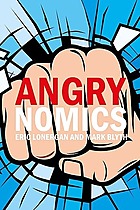
Mark Blyth
Mark Blyth is the William R. Rhodes ’57 Professor of International Economics and Director of the Rhodes Center for International Economics and Finance at Brown University. Blyth is a renowned political economist whose research examines how the interests of state level economic actors shape ideological consensus and institutional development at a global scale. He is acclaimed for his bold political predictions—from Putin’s invasion of Ukraine to the impacts of the Trump presidency to Brexit. His books include Austerity: The History of a Dangerous Idea, which was translated into 16 languages and won numerous awards, and Angrynomics, (with Eric Lonergan) a dialog on why our politics got so angry and what to do about it. Prior to Brown University, he was an Associate Professor of Political Science at Johns Hopkins University.
Mark Blyth Professional Experience / Academic History
Professional Experience
-
The William R. Rhodes ’57 Professor of International Economics and Director of the Rhodes Center for International Economics and Finance
-
Associate Professor of Political Science
Academic History
-
Ph.D., Political Science
-
M.Phil., Political Science
-
M.A., Political Science
-
B.A., Political Science
Blyth's research includes how economic and political institutions change, with special reference to the role of economic ideas in promoting such changes.
He is also interested in the analysis of economic and political agents dealing with situations of complexity and uncertainty.
His third expertise includes the political economy of finance and financial markets as well as the political economy of Modern Europe.
His study also focuses upon the causes of stability and change in the economy and why people continue to believe stupid economic ideas despite buckets of evidence to the contrary.
RECOGNITIONS
2024 International Studies Association's Distinguished Scholar Award
2019 Open Society Foundations' Individual Scholar Fellowship
2014 Hans Matthöffer Wirtschaftspublizistik-Preis
2003 Johns Hopkins University Class of 2003 George E. Owen Teaching Award
MEDIA & PUBLICATIONS
Blyth is a Contributor to Foreign Affairs and The Guardian and has appeared multiple times on Fox News, NPR, BBC and Bloomberg.
His co-authored and edited publications consider how powerful finance sectors shape policymaking, complicate existing narratives on EU economic policies, and ground the study of international political economy in a rigorous macroeconomic framework.
His articles have appeared in journals such as the American Political Science Review, Perspectives on Politics, Comparative Politics, and World Politics.


